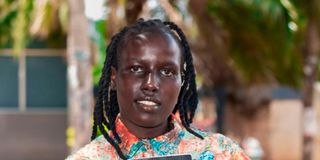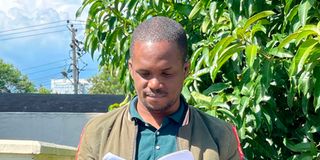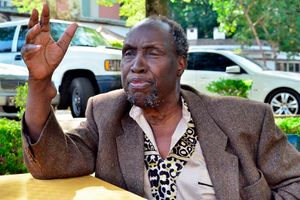
The emerging authors include Wafula Meshack, Dibora Zainab Hirbo, Ruth Jepkorir Koech, and Bernard Ochieng Omondi.
In the fast-evolving literary landscape, a new generation of young writers is emerging. Instead of waiting for the few renowned publishers to pick up their work, they are publishing their own stories in their teens and early 20s, and boldly preparing for the literary world ahead.
Inspired by pioneers like Ngũgĩ wa Thiong’o, who published his first novel, Weep Not, Child, at just 25, and Grace Ogot, who broke ground with her storytelling in the 1960s, these young talents have enough role models to look up to.
With resilience, mentorship, and a hunger for expression, they’re building literary legacies while young. As Ngũgĩ once said, “If you want to write, start now. Start when the fire is fresh.” For these writers, that fire is already burning.

Wafula Meshack, 23, is a final year student pursuing media and communication at Rongo University.
Wafula Meshack, 23
Attache in corporate and communication affairs at Rongo University
Wafula Meshack developed a passion for literature at a tender age, when he was living with his father who worked in a publishing company.
“He used to bring books home and gently force me to read them,” Wafula recalls. “I read a lot and desired to create my own stories.” Reading other people's work inspired him to want to write something others would like too.
Wafula’s passion peaked in Form Four. He composed stories in novel and anthology form. These early works were disjointed and often got lost, and in his second year at university, he enrolled for a creative writing class. “That's when other people started noticing me as a writer,” he said.
While his field of study is not literature, his love for English and literary arts guided much of his out-of-classroom work.
“The biggest challenge was finding good editors. Editors cost a lot of money, and many just want to earn fast money without delivering quality work.”
Despite the financial hurdles, Wafula persevered, often seeking help from English and literature lecturers who edited his manuscripts pro bono.
“I am not a self-publisher. I prefer to be patient and submit my work for proper editing, rather than rushing just to have a book out.” He believes literature should be respected like other serious professions such as law or medicine.
Wafula's earliest published works appeared in print journals and online publications like Writers Space Africa magazine, Tell the Impact Magazine, The Journal of Short Poetry (USA) and Colorful Chronicles Magazine through which he submitted fiction and non-fiction pieces.
Over time, he collaborated with other writers on anthologies, including Beyond the Pulpit (African Ink Publishers (AIP) in 2024) and Love Made in Africa (Mystery Publishers in 2024). The latest one is called Deadbeats, Bastard Mystery Children and Pagan Wives stories (Literary Editors Africa (LEA)2025).
Beyond the Pulpit and Other Stories cost Sh450 to publish and was sold at Sh1,000 per copy. He stated that the publication fee for Love Made in Africa was Sh890, with a selling price of Sh1,450. Regarding Deadbeats, Bastard Children & Pagan Wives Stories, Wafula explained that there were two printing options: High quality, which cost Sh700, and moderate quality, which cost Sh400. He set his own selling price, as there is no standard marked price.
Wafula finds encouragement from his lecturers, fellow writers, and university colleagues.
“I prefer communicating with words rather than with my mouth,” he explains. His writing often tackles themes of family, love, relationships, and social issues.
Despite his youth, Wafula does not feel limited in his ability to write complex stories. Some of his works addressing mature topics have even been rejected for being too bold. “People are often surprised that someone my age can write such stories,” he says.
While others prefer self-publishing, Wafula prefers traditional publishing for the quality and credibility that comes with it.
“Self-publishing is a cut short,” he says. He has worked with publishers such as African Ink Publishers, Literary Editors Africa and Mystery Publishers, an online publishing company.
Wafula is not certain whether writing will be his full-time job, but he views it as a crucial aspect of his existence. “I make more money from literature than from my media studies, yet for now, writing is just a hobby,” he says.

Ruth Jepkorir Koech, 23, is an undergraduate student at Kisii University pursuing a Bachelor of Arts in English and Literature, serving as an attache at Manga HEART in Kemera, Nyamira County.
Ruth Jepkorir Koech, 23
Attache at Manga HEART, a community-based organisation in Nyamira County
Ruth Jepkorir Koech is a poet who grew up in the scenic Cherangany Hills. Her love for poetry started in high school. she used poems as a tool for expressing the emotions and ideas she struggled to express.
She was mentored by people like Mr Ngeny Victor and Madam Lucy Okumu, who helped her develop her poetry by critiquing her work. She drew inspiration from renowned writers like Maya Angelou, Chimamanda Adichie, Ngugi wa Thiong'o, Grace Ogot, Christopher Okemwa and Prof Kivutha Kibwana.
Ruth’s poetry explores many themes including nature, romance, religion, politics, people, and pain. She finds truth in Maya Angelou’s words that creativity grows the more it is used. “The more I write, the more experience I gain, and my work gets better,” she says.
Ruth launched her first book in 2022 at the age of 20, Bile on My Smile, with Nairobi-based Nsemia Inc Publishers. She presented the book on October 8, 2022, at Machakos University during the KISTRECH International Poetry Festival. The book emerged first runner-up in published work in the 2023 Kenya University Performing Arts and Filming Association (KUPPA) competition at Maasai Mara University. Her most popular poem, African Queen, was featured as a solo verse at the KUPAA Music Festival and even translated to French.
Ruth's work has also been showcased in various anthologies and books, including the Kistretch International Magazine (2022-2024), Konch Online Magazine, Voices from The Wood by East African Educational Publishers, and Everyday Echoes Among African Scholars and Raconteurs (2025). Ruth is also a book reviewer and actress, and she describes herself as a “talkative introvert.”
Her interest in writing started when she was a child. She enjoyed reading novels and storybooks. She remembers being inspired by the book Ghost of Karma and performing drama and music during her high school years. Although initially she wrote poems in secret, she later shared them among her classmates, who appreciated her work.
Her experience of losing her mother at a young age had a great impact on Ruth's writing. It became a form of therapy for her.
“Writing enables me to express grief and pain I never did before,” she says. She was 20 years old when she first wanted to have a book published. Her university lecturer, Dr Christopher Okemo, and her father encouraged her.
She started by signing up for a creative writing class at Kisii University, where she was assigned to write poems about love and death during her first semester. Her lecturer helped edit the work, then sent it to the publisher.
A copy of her book sells at Sh600, and her recent book, Bile on My Smile, is currently being translated to Spanish.
Among the challenges she faces includes the fact that some publishers hesitate to accept poetry or question her work’s themes.
“Some say they don’t want poetry or put my work on the pending list for years,” she says. She is considering self-publishing to retain control and take charge of the royalties, even though it is costly.
Ruth is also a short story writer and recently became second in the Kisii Fest Short Story Competition, with her story, Pain We Carry, published on the Yours2read website.
She plans to publish her own collection of short stories by 2027. Her writing has earned her a full scholarship for her third and fourth years at Kisii University, with Hungarian poet István Turczi covering her fees and upkeep.

Benard Ochieng Omondi, 30, is a student at Maseno University Kisumu campus, pursuing a Bachelor of Arts degree in International Relations and Diplomacy.
Benard Ochieng Omondi, 30
International Relations and Diplomacy student at Maseno University
Benard began writing in early 2018, while undertaking his first degree in biochemistry at Kenyatta University.
“I was about 18 years old then,” he recalls. His very first book was an e-book on the history of Japan. He improved the first edition and released updated versions in subsequent years.
His inspiration to write about Japan’s history partly came from films such as 47 Ronin (2013), starring Keanu Reeves, and The Last Samurai. These movies sparked his interest in Japanese culture and history.
Benard has also written a book on military science titled Basic Fighter Maneuvers, which focuses on aerial warfare and the techniques pilots use during combat. “It explains the science behind why you should do this or that,” he laments.
This book was published by a printing and publishing firm called Xania-Goelway, which offers him free publication.
When he started, he faced several challenges, including a lack of understanding of global writing practices such as proper citation and referencing. “I relied mostly on Wikipedia and some YouTube clips because I did not have access to enough study materials.” Many discouraged and doubted him, but Benard was persistent and determined.
Support from his family played a big role in keeping him motivated. “My late father, who passed away last year, always told me to be strong and helped me get a new laptop when mine broke down.” Benard’s sister and mother assisted with getting the ISBN numbers for his books.
Benard’s first e-book was first made available on Course Hero, an online site. However, he could not monetise sales. Later, when his former classmate began a printing and publishing business, Benard was able to publish his books in hard copy.
“The publishing firm is great. They charge me nothing to publish, and I get about 70 per cent royalty on sales.”
Benard has so far published two books and several short pieces. Besides history and military aviation, he has also written on European politics and religious issues.
“A copy of a printed History of Japan goes for Sh7,400 while the eBook copies costs Sh2,500. Basic Fighters Maneuvers printed copy costs Sh1,400 while the eBook version costs Sh1,000,” says Benard.
“I've learned that it's always more important to be yourself. People will give you their opinions on what will and won't work, but being true to who you believe you are makes you strong.” Writing has also been therapeutic for him. “It takes the pain away and introduces some enjoyment. It helps me forget painful things that occurred such as my dad’s death.”
Benard is preparing a third edition of his book on Japanese history, this time on women's roles in Japanese history. He also plans to update his book on military aviation to international scholarly standards.

Dibora Zainab Hirbo, 22
Literature student at the University of Nairobi
Dibora discovered her love for writing in primary school. Her English teacher liked her lengthy compositions and told her that they were too long for the space allocated.
“She told me that I could be a good writer, so I gave it a try,” says Dibora.
While she was aged 15, she began writing short stories and compiled them into her first book, a collection of children’s stories called From the North, Full of Stories in 2019. She brought her stories to her English teacher, who approved them, then handed them over to a reviewer who said it was good enough to publish.
Since she was in boarding school, Nicholas Muturi, the reviewer, managed the publishing process. “He did everything and brought the copies back to school.”
The late Nicholas Muturi, a writer who visited her high school for writing competitions guided Dibora through my writing journey. Her family, especially her father, also supported her by funding her books’ printing and publishing.
When the first book was published, Dibora was delighted. “I didn't think I could write a whole book!” she says. Her school principal even called her to the assembly to thank her and handed out copies to all students. The book sold over 1,000 copies, and some were bought by the school principal.
Her second book, The Legacy of Justice (2018), was similarly founded on her interest in politics and law. Her third, Whispers of Faith (2022), is a recount of her time at university, while her fourth, Inward Bound (20224), is a self-help book.
She is now set to release her fifth book, Pieces of Yesterday, which is her most expensive and lengthy book so far, costing around Sh210,000 to publish.
Dibora works with different publishing firms, including Legacy Publishers in Nairobi and Flex Publishers in Meru, but prefers Legacy Publishers. She has never considered self-publishing, as she finds publishers to be more helpful and efficient.
Publishing books has its challenges, especially financial ones. “I have eight siblings, and with so many of us in school, it was hard to fund everything.”
She began paying her school fees after her first book launch, but financing future books and marketing remained difficult. Another challenge is the local community’s attitude toward reading and writing, which is limited.
“People don’t really appreciate writing. It is something new,” she explains. To promote her books, Dibora sometimes pays marketing companies, although some offer free reviews.
Her book prices vary in price depending on publishing and marketing fees. Whispers of Faith costs Sh1,050, Inward Bound sells at Sh2,000, while her maiden book is Sh1,000.
Dibora enjoys writing fiction the most because it allows her to be creative. “Writing gives me identity and a space to vent,” she says. It has also helped her connect with people and grow socially. “Before, I wasn’t very social, but writing has opened doors for me to relate with others.” Her favorite author is Colleen Hoover.
“I want to be one of the world's best-selling writers.” She also dreams of someday writing a political book.






